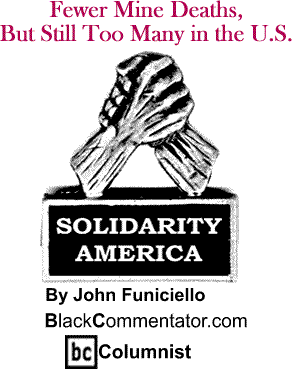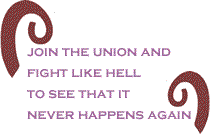
|
||||||||||||||||||||||
|
||
 |
||
Monday�s mine disaster in southern
Coal mining never was a safe occupation. Just the idea of having so many workers so far down in the belly of the earth where they could not be reached in case of an emergency was enough to send many to find some other line of work. All anyone could do during the rescue operation was mourn for the dead and pray for those missing and give as much support to their families as possible. Those things were being done this week and everyone not actively engaged in the rescue just held hands, gathered at churches and public buildings and private homes�and waited. Despite the numbers of underground
coal mines in the eastern In some ways, they don�t want people commenting on a disaster such as that in the Upper Big Branch mine Monday afternoon. That is, they don�t want comments from people who are not miners themselves. They don�t believe that anyone else can appreciate the dangers that underground miners confront every day. They don�t think that anyone else can know the concern of the family members who wait at the surface for the duration of every shift - every day, throughout the year. But there are many miners who know that, to make the mines safer, there had to be someone demanding that the government that regulates working conditions do something about the mine disasters that occurred regularly for a century.
Miners in the As miners have said, over time, �I�ve got the dust.� They�re speaking of coal dust
and there have been some advances made in combating the conditions
that cause black lung in the In Here in There are ways to curb the disasters in the mines from other causes too, such as the build-up of methane or any other gas deep in the mines that, when they are touched off by a spark or other cause, can result in a disaster like Monday�s. These efforts also are hard-fought and it takes a long time to achieve results. The United Mine Workers of America (UMWA) has fought for mine safety improvements for years, just as hard as it has fought for better pay, health benefits, and pensions. Although the union has not eliminated all of the dangers, it has made progress. Whatever they have been able to achieve, it has been in the face of fierce opposition by mine owners, politicians and judges who have benefited from their relationships with corporate mine owners, and even fellow miners and neighbors. Comments on one website after the explosion Monday indicated that anyone who pointed out that mine safety needs to be improved and that this will be a tough struggle, was engaged in �political� talk. Considering what happened to so many families this week, there needs to be an increase in such �political talk.� Speaking from the headquarters
of the UMWA in Triangle,
It would be unfortunate if Massey Energy and the community of Montcoal were to reject the offer of assistance from the UMWA, although corporations of great power have exerted unrelenting pressure on communities of workers to ensure that there is a divide between those communities.
It�s that solidarity that gives workers, their families, and their communities the strength to fight for changes that will make their jobs safer and make their lives a little better. No family should be apprehensive about a loved one simply going to work, yet miners� families, even though they have become accustomed to the feeling, can�t escape that apprehension completely. Not on a single day. It was said this week that �only� 34 were killed in mine accidents last year in the U.S. Contrasted with the thousands who were killed (sometimes hundreds in a single incident) in 20th Century mine disasters, that may not seem like many, but that�s not good enough.
BlackCommentator.com
Columnist, John Funiciello, is a labor organizer and former union
organizer. His union work started when he became a local president
of The Newspaper Guild in the early 1970s. He was a reporter for
14 years for newspapers in |
||
If you would like to comment on this article, please do so below. There is a 400 character limit. You do not need a FaceBook account. Your comment will be posted here on BC instantly. Thanks. Entering your email address is not mandatory. You may also choose to enter only your first name and your location.
|
||
Thank you very much for your readership. |
||
| Any BlackCommentator.com article may be re-printed so long as it is re-printed in its entirety and full credit given to the author and www.BlackCommentator.com. If the re-print is on the Internet we additionally request a link back to the original piece on our Website. | ||
| |
||
April 8, 2010 |
| Executive Editor: David A. Love, JD |
| Managing Editor: Nancy Littlefield |
| Publisher: Peter Gamble |
| Est. April 5, 2002 |
| Printer Friendly Version in resizeable plain text format |
 |
 |
 |

|
 |
| |
| |


































 Unions
formed among miners and were some of the toughest and most unified
workers in the nation. Over time, despite the incredible power of
the coal and �energy� companies and their fight against sensible
regulations, the miners prevailed and, by degrees, mining became
somewhat safer.
Unions
formed among miners and were some of the toughest and most unified
workers in the nation. Over time, despite the incredible power of
the coal and �energy� companies and their fight against sensible
regulations, the miners prevailed and, by degrees, mining became
somewhat safer.
 Corporate
Corporate










